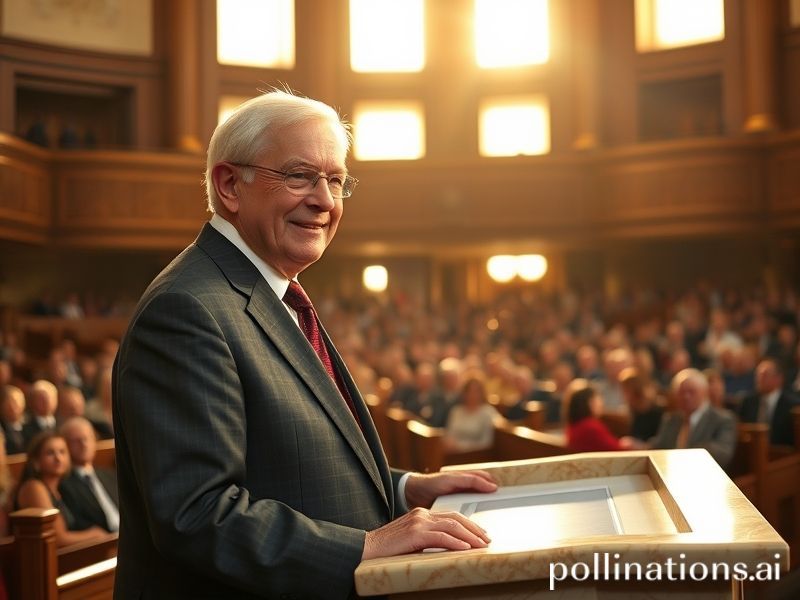99-Year-Old Prophet, $100B Portfolio: How Russell M. Nelson Is Quietly Rebooting Global Religion
The World According to Russell M. Nelson: A Non-Mormon Planet Watches a 99-Year-Old Heart Surgeon Rewrite Global Religion in Real Time
By Dave’s Locker International Bureau
In the grand geopolitical casino, where nuclear buttons are fondled like worry beads and billionaires race to Mars to escape the mess they financed, Russell M. Nelson has quietly become the house dealer for an entire transnational denomination. The 99-year-old president of The Church of Jesus Christ of Latter-day Saints—yes, the one your Tinder date ghosted you to go on a mission for—has spent six years re-engineering a 200-year-old American folk religion into something that looks, to the untrained eye, like a multinational NGO with a celestial HR department. The world, as always, is taking notes between drone strikes and avocado shortages.
From Singapore to São Paulo, the ripple effects are unmistakable. When Nelson announced in 2019 that the word “Mormon” was now officially a slur (roughly on par with calling the Church a “polygamous start-up”), marketing departments from Salt Lake to Seoul had to throw out a decade of SEO work. Suddenly, websites, hashtags, and glossy airport-kiosk pamphlets were obsolete, replaced by the bureaucratic tongue-twister “The Church of Jesus Christ of Latter-day Saints™.” Somewhere in the metaverse, a junior copywriter cried into his fair-trade coffee.
Meanwhile, the Church’s global real-estate portfolio—estimated at around $100 billion, give or take an apostle’s weekend hobby—keeps ballooning. Nairobi got its first temple last year, a gleaming white fortress amid traffic jams and power cuts, offering celestial marriage to Kenyans who still queue for clean water. Critics call it tone-deaf; admirers call it aspirational branding. Either way, the temple’s celestial spire now competes for skyline dominance with Chinese-built telecom towers, a neat metaphor for soft-power jousting in the global South.
Nelson’s most dramatic sleight of hand, however, has been the 2018 repeal of the priesthood ban on the children of LGBTQ parents. Overnight, wards in Stockholm and Sydney scrambled to update lesson manuals, while bishops in Lagos wondered if they now had to shake hands with people they’d only ever prayed about in abstract, judgmental terms. The policy reversal was announced not via smoke signals from the Great and Spacious Building, but—because irony is dead—via a slickly produced YouTube video, algorithmically blessed to appear in your “Up Next” queue right after a cat failing a backflip.
Europe, ever the continent that invented both existentialism and VAT, responded with its usual cocktail of bemusement and fiscal panic. German tax authorities, who still classify tithing as a charitable deduction, began asking whether rainbow-inclusive doctrine changes the Church’s legal status as a “public-law corporation.” In France, intellectuals debated—over tiny glasses of wine, naturellement—whether Mormon post-secular rebranding is proof that late-stage capitalism has finally hacked the afterlife.
Asia, for its part, is less interested in theological nuance and more in outcomes. South Korean millennials, facing a fertility rate that rivals Antarctica’s, see Mormon family-centric messaging as either quaint or ominous, depending on how recently their own parents demanded grandchildren. In the Philippines, where the Church’s charity arm distributed millions of dollars in pandemic aid, Nelson’s name is spoken with the same reverence usually reserved for Manny Pacquiao—minus the senatorial gaffes.
And what of the man himself? At an age when most mortals are arguing with insurance actuaries about stair-lift coverage, Nelson globe-trots with the stamina of a diplomatic courier half his age. He blesses vaccines in the Pacific, dedicates temples in the Middle East (yes, Dubai now has a celestial waiting list), and still finds time to tweet platitudes in all-caps like a prosperity-gospel fortune cookie. One can almost hear the ghost of Otto von Bismarck muttering that God has a special providence for fools, drunks, and centenarian surgeons with private jets.
In the end, Russell M. Nelson’s international significance boils down to a very human paradox: the older he gets, the faster he changes a religion founded on the idea that nothing ever changes. The rest of us—pagan, papist, or merely hungover on a Sunday—watch with the same morbid fascination we reserve for billion-dollar space launches and TikTok coups. The planet keeps spinning, the stock market keeps coughing, and somewhere in the cloud, a 99-year-old prophet keeps uploading software patches to eternity. Welcome to the future; please keep your baptismal jumpsuit dry.







